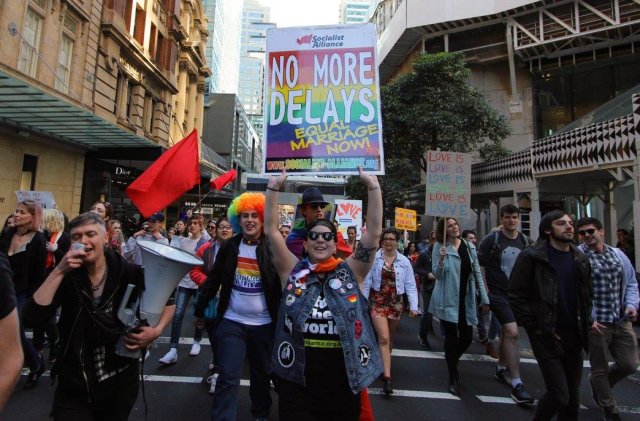
If we needed any more proof that Prime Minister Malcolm Turnbull's plebiscite on equal marriage is a spurious delaying tactic we got it on August 21 when the media reported that the vote will now be pushed back to February 2017, some 18 months after it was first proposed.
Not only has Turnbull broken his pre-election pledge to hold the controversial plebiscite by the end of this year, he has again deferred to the religious right, led by outspoken anti-equality Liberal Senator Cory Bernardi.
Turnbull has justified the delay as based on advice from the Australian Electoral Commission. But in reality, it is a political question.
A majority of Australians support marriage equality — and have for some time. A 2014 poll by Crosby Textor found that 72% support it. Since 2009, various polls have shown between 62% and 68% support.
Now, the Coalition's delaying tactics have made a lot of people worried about the impact of its non-binding plebiscite.
A poll commissioned by Parents and Friends of Lesbian and Gays (PFLAG) Australia found that 85% of the LGBTIQ community opposed a plebiscite, with 62% opposed even if the question was “fairly framed and has a good chance of success”.
Some, like Bernardi, support a plebiscite because they hope to be able to use it to build the conservative, homophobic movement. Bernardi purports to represent a “silent majority”, but the polls disprove this.
A recent Galaxy poll showed less than half of Australia back a plebiscite. A July poll, commissioned by PFLAG, found 48% supported the plebiscite, 30% oppose it and 20% were undecided.
Former High Court judge Michael Kirby speculated on August 22 that the plebiscite method was chosen for its fraught history and propensity for failure. “It's time Parliament did address itself to the issue of marriage equality and giving it out to a plebiscite is simply an endeavour to delay or defeat the measure,” Kirby said.
Supporters of equal marriage are also concerned about how the plebiscite question will be pitched. It was recently leaked that the question would be framed along the lines of: “Do you approve of a law which would permit two people of the same sex to marry?”
This is extremely problematic. The question carries a moral overtone and places the LGBTQI community in a position of having to seek permission for their right to marry. The use of the words “approve” and “permit” are very loaded. Approval has a different meaning to “agreement” or “support”.
The wording is designed to provoke the so-called “non-homophobic” homophobes who say things such as, “Well, I don't approve of what you're doing, but I'm glad you're happy” to vote against in the plebiscite.
The use of the term “same-sex” is exclusive: it excludes some intersex, transgender and non-binary people. The marriage equality campaign is not only about rights and choices for gays and lesbians, it is about marriage equality for the whole LGBTQI community.
Opposition leader Bill Shorten said Labor is likely to block the plebiscite legislation, and that it will table a private member's bill for marriage equality during the first sitting week of the new parliament.
While it may have a chance of getting this legislation through the Senate, the bill will not pass the House of Representatives, where the Coalition has a one seat majority.
The task of passing the bill is made even harder by the fact that Labor has said it will not bind its MPs to vote in favour of marriage equality — despite having a policy of supporting marriage equality — until 2019.
For years, campaigners from many political backgrounds have been calling for a marriage equality bill to be put and passed now. Delaying a decision on this is tantamount to encouraging homophobia.
If a bill is put and fails, and a plebiscite follows, the campaign will need to swing behind a “Yes” vote. We should have nothing to fear from a community-wide discussion about this important civil right. After all, the majority has already spoken up loudly.
The LGBTQI community has had enough. People's lives and rights are at stake. It's well past time for Australia to join the growing list of countries that have legalised equal marriage.
Ditch the delaying tactics. Stop playing with our lives. We demand marriage equality — not in 2017, 2018 or 2019 — but now.
Like the article? Subscribe to Green Left now! You can also like us on Facebook and follow us on Twitter.